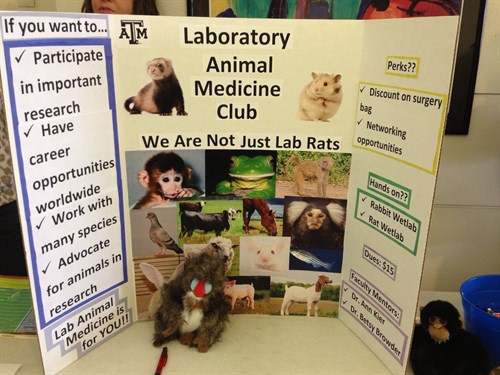
Welcome to the official website for the Laboratory Animal Medicine Club at Texas A&M University College of Veterinary Medicine and Biomedical Sciences! We are a student chapter of the American Society of Laboratory Animal Practitioners. Our organization is dedicated to providing education and opportunities to those interested in pursing a career in laboratory animal medicine.
Dues:
$20/year
Perks:
- Interesting speakers
- Exciting field trips and activities
- Hands-on wetlab
- Networking opportunities
- Discount on surgery bag
- 4 free lunches during the semester
Why Laboratory Animal Medicine:
“Laboratory animal science is a field of science devoted to the production, care, and study of laboratory animals used in biomedical research and education. It is a large field comprised of professionals from many scientific and educational disciplines such as anatomy, animal science, comparative biology, engineering, environmental science, ethics, genetics, microbiology, pharmacology, physiology, and toxicology. Professionals within this field have a deep sense of purpose and are dedicated to helping society and improving the lives of people and animals alike.” — American Association for Laboratory Animal Science
Q/A:
Q: Can I still join the club if I don’t want to go into laboratory animal medicine?
A: Absolutely! This club is any veterinary school student that is interested in research, helping society and improving the lives of people and animals alike. Additionally, the club can get speakers related to the interest of the club’s members. However, if you are wanting to be an ACLAM Diplomat Veterinarian, this would be the perfect club to join.
Q: What hands on animal experience will the club provide me?
A: We currently offer one wetlab per semester using Rattus norvegicus (Fall semester) and Oryctolagus cuniculus (Spring semester). During the wetlabs, students have the opportunity to perform restraint, anesthesia, vascular access, peripheral catheter placement and a variety of other procedures. These labs are directed and taught by Board Certified ACLAM Veterinarians, Veterinary ACLAM residents, experienced laboratory animal technicians and experienced veterinary school students.
Q: What type of speakers do you have at meetings?
A: We have a wide range of speakers, in which most are ACLAM boarded veterinarians. Speakers typically discuss research they perform, their research facility, and how they became a research veterinarian. Animal species covered in these lectures have been non-human primates, horses, cattle, sheep, pigs, dogs, cats, fish, mice, rats, rabbits, etc. Subjects and speakers can be selected depending on interests of the club members.
Q: What field trips does the club provide?
A: The club typically has anywhere from one to three field trips per semester. We have visited research facilities such as TIPS and the CMP facility at Texas A&M University and MDAnderson Cancer Research Center in Bastrop, TX. We have also had a behind-the-scenes tour of the Houston Zoo. Trips can be selected depending on the interests of the club members.
Q: What resources does the club have to help me purse a career in lab animal medicine?
A: The club is designed to help veterinary school students get exposure to the field of laboratory animal medicine. Additionally, the club is also designed to help veterinary school students pursue a career in laboratory animal medicine if desired. The club’s faculty mentor is a board certified ACLAM veterinarian and helps 3VM and 4VM students pursue the alternative track for lab animal medicine. The club is also has close ties with the director of the Comparative Medicine Program at Texas A&M University as well as the director of the ACLAM Resident Program at Texas A&M University. Moreover, the club typically holds a meet and greet with the club members, ACLAM Residence and ACLAM Directors at the beginning of the school year. Additionally, the club typically holds a meeting with the 4VM students and ACLAM Residence at the end of the school year designed to help those wanting to pursue a career/externship/residence in the field of laboratory animal medicine. This meeting is designed to give insight on programs, how the MATCH system works and how to setup and get through the alternative track.
If you have any other questions for the LAM Club, you may email any of the officers.
